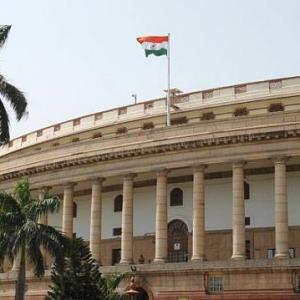The prime minister, I believe, still enjoys a majority in the Lok Sabha if push comes to shove, but 'majority' and 'authority' are two different things', says T V R Shenoy.
What is the best way to ignore the wretched pain of a nagging headache? Simple, drop a concrete ball on your foot.
Did I not just write that last week? Yes, but now I can add 'It takes a special kind of genius however to throw that concrete ball in the air, then catch it on your head'!
I still believe that the timing of the announcement about opening up the retail sector to foreign direct investment was a ploy, meant to divert attention from the black money issue and issues related to corruption. But the manner in which it was done proved to be so amateurish that it has resulted only in a truly spectacular own goal.
The prime minister, I believe, still enjoys a majority in the Lok Sabha if push comes to shove, but 'majority' and 'authority' are two different things. Just half the life of the fifteenth Lok Sabha is over but when you look at Dr Manmohan Singh you must now automatically insert 'lame duck' before 'prime minister'.
A graphic demonstration of this came when leaders from Kerala went to meet the (lame duck) prime minister over the issue of the Mullaperiyar dam. The Kerala delegation wanted Dr Manmohan Singh to organise a conference with the chief minister of Tamil Nadu. The poor man did not turn them down but he wondered aloud whether J Jayalalithaa would accept his invitation.
When was the last time that a prime minister of India was forced to ponder whether the chief minister of a state would have the time to meet him?
'We have thought a lot and firmly believe that this decision will benefit us a lot,' Dr Manmohan Singh told Youth Congress leaders at a jamboree organised by Rahul Gandhi on November 29. There was much talk of how this would help farmers when FDI money poured in to create cold storage facilities.
On December 4, an exultant Mamata Bannerjee declared that the only thing going into cold storage was the Manmohan Singh ministry's proposal.
I do not want to discuss the merits of FDI in retail -- it is surely pointless right now! -- but who is responsible for this mess?
Some blame the Left. Others hold the BJP to fault. Yet more criticise the Trinamool Congress. Are these valid arguments?
The Left has always opposed opening up retail -- much of economic liberalisation, in fact -- and nobody should have had any illusions as to how the CPI-M would react.
Much has been made of the BJP's support for FDI in retail in the National Democratic Alliance's joint manifesto of 2004. That proposal placed an upper limit of 26 per cent rather than 51 per cent actually, but the point is that this was categorically dropped in the manifesto of 2009. That was two-and-a-half years ago, surely ample time for someone in the Congress to read it.
Should the fiasco then be laid at Mamata Bannerjee's doors? Not really, she too has gone on record on more than one occasion to oppose the idea of FDI in retail.
The truth is that none of this would have mattered had the Congress itself backed Dr Manmohan Singh as it did over the nuclear technology issue in 2008.
My colleagues in the media chose, for the most part, to focus on the National Democratic Alliance and the Left Front. Why was nobody paying attention to the Congress?
Ramesh Chennithala, the president of the Kerala Pradesh Congress Committee, wrote to Dr Manmohan Singh to oppose FDI in retail. (Once again, when was the last time that a Pradesh Congress Committee chief sent such a letter to a Congress prime minister?) Not content with this, the KPCC president then asked Kerala Chief Minister Oomen Chandy not to implement the decision in the state.
Haryana too has a Congress ministry in place. But when asked to comment on the issue, the state's excise and taxation minister, Kiran Chaudhary, would only say, 'We will do what is best for the state. We are yet to take a view.' Not exactly a ringing endorsement, is it?
'Sultanat Shah Alam az Dilli ta Palam!' -- 'The great king Shah Alam rules from Delhi to Palam!' -- was a common saying in the days of that decrepit Mughal ruler. Kiran Chaudhary, whose state's frontier is a stone's throw from Palam -- the site of Delhi's airport -- has given poor Dr Manmohan Singh a lesson in history.
Actually Shah Alam was better off than a Dr Manmohan Singh whose writ does not run even in Delhi itself. The chief minister of Delhi announced, "'We [the government] neither own land nor issue licences to retail shops. Whether to allow FDI in the city is going to be a collective decision by the Union urban development ministry, the Delhi government, and the Municipal Corporation of Delhi.'
In plain language, Sheila Dikshit was placing the responsibility squarely between an MCD that is currently dominated by the BJP and the Manmohan Singh ministry.
Was Dr Manmohan Singh unaware of Ramesh Chennithala's letter, of Sheila Dikshit's ducking the blame, and Kiran Choudhary's statement when he spoke to the Youth Congress? Or was, as some have it, throwing the gauntlet at the Congress 'high command' as much as at the Opposition?
If so, the poor man was rapidly shown his place by Sanjay Singh, a Congressman and the Lok Sabha MP for Sultanpur. For those unaware of the geography of Uttar Pradesh, Sultanpur is the constituency abutting Rae Bareli and Amethi, the seats won by Sonia Gandhi and Rahul Gandhi respectively. (Sanjay Singh was born into the erstwhile royal family of Amethi.)
Does anyone believe Sanjay Singh's open defiance was not a signal from the Nehru-Gandhi dynasty? If so, when was the last time that a Congress MP told a Congress prime minister to stuff his policies without being hauled up before a disciplinary committee?
Opening up the retail sector to FDI was always going to be a nonstarter in the circumstances of 2011. Take a look at the map to see why -- the governments of Uttar Pradesh, Bihar, West Bengal, Madhya Pradesh, Odisha, and Tamil Nadu were quick to state that they would not permit it.
We may safely assume that some other states -- such as BJP-ruled Gujarat and Karnataka -- would toe the party line. With outright opposition from both the Congress and the CPI-M, the policy would never fly in Kerala, and Haryana, as seen above, was lukewarm at best.
Does anyone believe that a Walmart, a Tesco, or a Carrefour, would pour billions into India when well over half of the country was shut to it, and it faced opposition in all the rest?
Announcing that the retail sector was being opened up to FDI was nothing more than a diversionary tactic at best, to prevent debate over a hot-button topic like the list of Indians who have (probably illegally) stashed money in accounts abroad.
That said, a slightly more politically astute government could have handled issues differently. The decision may, as Commerce Minister Anand Sharma still insists, been within the domain of the executive. But, to quote Talleyrand, if it was legal, it was also 'worse than a crime, it was a blunder.'
The (lame duck) prime minister may still have a majority, but he no longer enjoys any authority.








